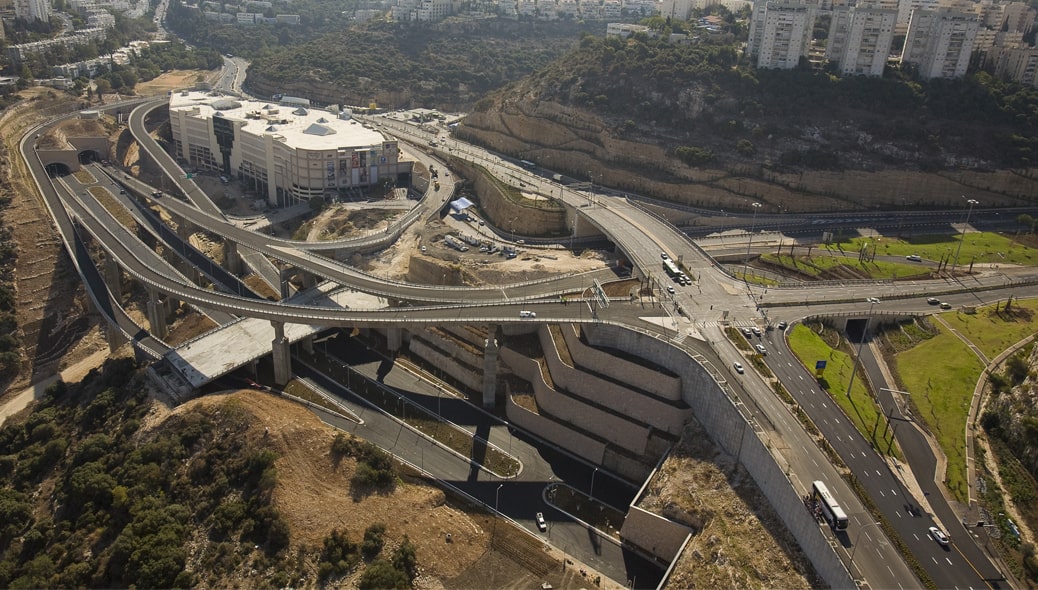Home > Shikun & Binui Solel Boneh
SHIKUN & BINUI SOLEL BONEH
ABOUT US

Photo: Albatross
The Shikun & Binui Group’s civil engineering and construction arm in Israel. The company is a registered contractor, with the maximum certifications in all its areas of activity.
History and Legacy
Solel Boneh is the oldest company in the Shikun & Binui group. Founded in 1920 under the name Office for Public Works, it has operated as Solel Boneh since 1924. From its foundation to the present day, the history and legacy of Solel Boneh have been an integral part of the story of the establishment and development of the State of Israel.
In its earliest days, the company served as the operational arm of the Histadrut General Federation of Labor for construction and public works in Eretz Yisrael (the Land of Israel). At the same time, it acted as a vessel for immigration absorption and for providing occupational training to many of the workers who came to Israel. In 1927, a severe economic crisis caused the company to suspend its activity until 1935; it was then reestablished as a joint-stock company owned by the Workers’ Society. Over the following years, Solel Boneh expanded its scope to encompass the realization of Israel’s defense and settlement goals. During the Second World War, Solel Boneh built infrastructures for airports, roads, bridges, and military bases for the British government, in Eretz Yisrael and in Egypt, Syria, Iraq, Cyprus, Iran, and Bahrain. In the 1940s, its activities expanded into industry: the Nesher concrete factories, the Vulcan foundries, the Phoenicia glass works, and the Hamat metal factories.
Solel Boneh’s involvement in defense and military endeavors during the period of the Jewish Yishuv (settlement) in Eretz Yisrael, before the foundation of the State of Israel, is described in a book by Doron Rosen, Solel Boneh in the Service of the Jewish Yishuv in Eretz Yisrael, 1936-1948. The book describes the work of creating the security and holding system on Israel’s northern border, the key role played by Solel Boneh in Tower and Stockade operations and in the overall expansion of the settlement, its involvement in covert intelligence collaboration between Jewish Yishuv institutions and British espionage organizations during World War II, the assistance extended by Solel Boneh and its employees to the Mossad Le-aliyah Bet immigration operatives in Arab countries, the ways it aided the Mossad Le-aliyah and the Palmach naval units in clandestine immigration by sea, its role in the settlement of the northern Negev desert and in the fortification and reinforcement of the Negev, the essential contribution of Solel Boneh to the building of fortifications and defensive structures in many areas of Israel during the War of Independence, and more.
In the early period of Israel’s statehood, Solel Boneh was central to the construction and development of the country. The key challenge facing the young nation was the accelerated absorption of immigration. Solel Boneh built immense numbers of homes at a meteoric pace, for the government and for the Histadrut’s housing companies, Shikun and Neveh Oved (which merged in the 1950s to become Shikun Ovdim, later Shikun & Binui Real Estate). During the same period, Solel Boneh also developed industrial plants, carried out public and private projects in Israel, and performed construction and road-building work in other countries.
Over the years of its existence, Solel Boneh has built prominent projects and landmarks that are interwoven with Israel’s history: Kiryat Hamemshala (the government compound) in Jerusalem, the International Convention Center in Jerusalem (Binyanei Hauma), the Yad Vashem World Holocaust Remembrance Center, Soroka Hospital, the Rutenberg power plant in Naharayim, the Reading power plant in Tel Aviv, the Orot Rabin power plant in Hadera, the King David Hotel, the Hilton Hotels in Tel Aviv and Jerusalem, the Dan Hotel in Tel Aviv, the Hyatt Hotel in Jerusalem, the Hakirya Ministry of Defense offices, the Heichal Hatarbut concert hall in Tel Aviv, the Cameri Theater, the Shalom Tower, the Haifa Court Justice Hall (Heichal Hamishpat), the ports at Haifa and Ashdod, and more.
Today, Shikun & Binui Solel Boneh continues to lead, at the forefront of Israeli construction and of the ongoing growth of Israel.
Most essential of all of the assets of Shikun & Binui Solel Boneh is its outstanding, highly skilled team of extensively experienced people, who make history through their work every day.
Over the years, the company’s past and present employees have accumulated a fascinating archive of materials that offer a glimpse into the story of Israel’s foundation and construction, displayed on the Solel Boneh retiree website.

